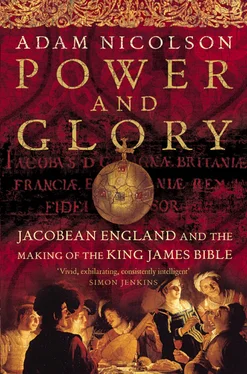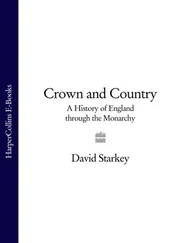Two of the other Puritans, John Knewstubs and the charming, mild-mannered Laurence Chaderton, had been at Cambridge with Lancelot Andrewes and used to have âconstant meetingsâ with him there. Their lives had certainly diverged â Chaderton and Knewstubs both had a radical Presbyterian past behind them, of which Andrewes would certainly have disapproved â but even so there was a great deal uniting them. They had all studied the ancient languages together, read the Bible together and teased out the details of âGrammatical Interpretationâ together, âtill at last they went out, like Apollos, eloquent men, and mighty in the Scripturesâ.
This was not an encounter of parties at each otherâs throats. Chaderton, who was now the Master of Emmanuel College, Cambridge, and one of the most loved of all men in that university, had also as an undergraduate been the greatest friend of Richard Bancroft, another man who now stood opposite him, as his chief opponent and Bishop of London, scourge of Puritans and Whitgiftâs chosen successor for the see of Canterbury. When they were students together at Cambridge, during one of the often-repeated clashes between town and gown, Chaderton had actually saved Bancroft from a mob of enraged citizens.
Bancroft had become a severe, ruthless sleuth after Puritan error. As Whitgiftâs right-hand man in the 1580s and â90s he had hunted out and destroyed the Elizabethan Presbyterian movement (of which Chaderton and Knewstubs had been a part). It was a bruising process, which according to Thomas Fuller, the seventeenth-century church historian, âhardened the hands of his soul, which was no more than needed for him who was to meddle with nettles and briarsâ. That is certainly what Bancroft looks like in his portraits: a weather-tested man, as rough as a hill-farmer, ruthless with any opposition. But he and Chaderton remained friends. Both were from Lancashire where wrestling is a traditional sport and the two men, Master of Emmanuel and Bishop of London, liked to wrestle when they met.
The establishment of Jacobean England was as small as a village. It was intimate with itself, engaged in endless conversation. The currency of this world was talk between people who had known each other all their lives, and the intimacy of those relationships was crucial to the nature of the conference and its outcome, and to the qualities of the Bible that would eventually emerge from it. As usual, in what is billed as a critical public meeting, a great deal had been squared off in private beforehand. There had been manoeuvrings for months, a little ballet at the heart of seventeenth-century England, in which bishops, both Calvinist and anti-Calvinist, moderate reformists, politically radical Puritans, an episcopally-minded but reformist-sympathetic king and a wary Council, had danced around each other, if not with swords out, at least with hands on hilts. And this was the result.
The true extremists, those who wanted to dismantle the Church of England and replace it either with a confetti of independent and Separatist congregations or with a true Presbyterian system from which bishops were to be abolished, had been excluded. Many of them were meeting in London at this very moment, frustrated and outplayed. James had said quite explicitly that he didnât want the âbrainsick and heady preachersâ but âthe learned and grave men of both sidesâ. That is what he had got. The so-called Puritan party had probably been chosen by the Privy Council, perhaps by Cecil. Various preparatory lists and suggestions survive; those eventually chosen were the most moderate, bishop- and king-friendly. Dressed up as a meeting of opposites, this conference was in fact the bringing together of a near-consensus.
Not all the people gathered in this room were well born, and hypersensitivity to class origins coloured all relationships, but that is far from the whole story. The Cecils themselves had been little more than Welsh farmers only sixty years before (and remained crushingly aware of the meanness of their origins). Lancelot Andrewesâs father had been a master mariner in London, Bancroftâs a minor member of the northern gentry, Whitgiftâs a Grimsby merchant, Chadertonâs a rich squire who taught him to hunt and little else. But brilliance and education had lifted them all into the intimacy of this elite. These were the people in whose hands the future of the Church of England lay and they all knew each other. They were deeply opposed on important issues but a single envelope, what would nowadays be called a single discourse, contained them, and much of the peaceableness of England can be explained by that. One governing culture was accessible to the gifted sons of great and relatively humble families. It is not difficult to imagine the murmured conversations between them as they stood waiting in groups as the winter sunshine made its way through the thick grey-green panes of the Tudor windows.
The only outsider, ironically enough, was the king. He had scarcely known bishops, and never seen the surplice or the cross before coming to England. He spoke with an acutely Scottish accent, and pronounced his Latin and Greek in ways the English could scarcely understand. And as the incident at Newark had shown, his touch was not always sure. It was in many ways Jamesâs sheer oddness which steered the conference into its rather dark and confused channels.
First he sent word that the reformists should retire. He wanted to speak to the bishops and deans alone; they were to sit on one side of the room. The Privy Council was to sit and listen on the other. The four Puritans left and the Lord Chamberlain shut the door behind them. After a while, as the lords and bishops waited there in silence, the king came in. He was charm itself, âpassed a few pleasant gratulations with some of the Lordsâ, and then sat down in the chair that stood in front of the cloth of state. He kept his hat on as he surveyed the great Englishmen around him.
He was of course practised in the role. He had been king of a bitterly divided nation for as long, quite literally, as he could remember and now he wooed his audience. âSalomon speaketh â, the unctuous William Barlow, Dean of Chester, reported, in the ever-repeated cliché of the reign. Jamesâs words, falling on the ears of his amazed and delighted hearers, Barlow said, were âlike Apples of gold, with pictures of siluerâ.
Barlowâs account makes it seem as if king and bishops had shown little but love and harmony to each other, but they hadnât. Barlow (a Translator â he would chair the key committee in charge of the New Testament epistles) was lying. The king had fiercely attacked the bishops and openly slapped them down. The dean was the official propagandist for the bishopsâ cause, and his pamphlet was a carefully slanted version of events. When he tried to dedicate it to Robert Cecil, Cecil refused. Anyone whose method of survival was distance and non-commitment would certainly not have wanted to be identified so thoroughly with a single party. Barlow was acting on Bancroftâs instructions. Bancroft wanted to make it appear that the king was on the bishopsâ side. But there were others, more objective (their identity has never been established), taking notes at the same time and it is clear from what they wrote that things on this first day were far from harmonious.
James did begin smoothly and graciously.
It pleased him both to enter into a gratulation to Almightie God (at which wordes he put off his hat) for bringing him into the promised land, where Religion was purely professed; where he sate among graue, learned and reuerend men; not, before, elsewhere, a King without state, without honour, without order; where beardless boys would braue him to his face.
Читать дальше












